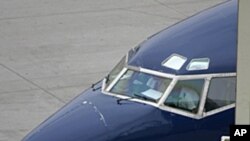As the United States celebrates Black History Month, the struggle for racial equality continues on many fronts - including in the quest for professional acceptance among black pilots. It's a battle that dates back to the 1930s.
Tuskegee Airmen
The 1945 Army Air Forces movie "Wings for This Man" celebrates the Tuskegee Airmen, the first African-American military aviators in the U.S. armed forces.
The pilots, who flew combat missions during World War II, faced many challenges. They trained on run-down runways. Their commanders were white officers who mostly stayed in the position just long enough for a promotion before transferring to another unit. It was a program that some believe was initially set up to fail.
"The whole Tuskegee airmen experiment was not an experiment to show that blacks could fly airplanes or that blacks should serve in the military and an elite organization," says Eugene Stanley, vice president of the Black Pilots of America. "It was put in place to show that we did not have the mental capacity or the physical aptitude to be able to handle complex machinery like an airplane. Well, clearly, they were wrong."
Early pioneer
The Tuskegee airmen were not the first black pilots to break barriers.
John W. Greene, who became a commercially licensed pilot in the 1930s, created his own opportunities.
"At a time when it was extremely difficult for black people to have an opportunity to fly," says Frank Green, president of the Chesapeake Blackhawks, a local Maryland chapter of the Black Pilots of America, "he not only flew an airplane but was the first black individual to own and operate an airfield in America."
Green says, while celebrating history is important, realizing discrimination remains should also be addressed. He says among contemporary black pilots, very few do well professionally in terms of commercial airlines.
"Actually here in America, the number of airline pilots who are captains are very, very small, really miniscule," says Green. "I think it is about two percent."
He suggests that today's black pilots follow the example set by the Tuskegee Airmen and John W. Greene - who rose to new heights despite discrimination - by creating their own opportunities and seeking employment at smaller regional airlines where they can attempt to quickly work their way up to greater success.














